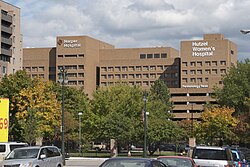This article needs additional citations for verification .(May 2019) |
| Hutzel Women's Hospital | |
|---|---|
| Detroit Medical Center | |
 Harper Hospital and Hutzel Women's Hospital | |
 | |
| Geography | |
| Location | Detroit, Michigan, United States |
| Coordinates | 42°21′07″N83°03′25″W / 42.35186°N 83.05682°W |
| Organization | |
| Type | Specialist |
| Services | |
| Speciality | Women |
| History | |
| Opened | 1868 |
| Links | |
| Website | www.hutzel.org |
| Lists | Hospitals in Michigan |
Hutzel Women's Hospital, formerly the Women's Hospital and Foundling's Home, is one of the eight institutions that compose the Detroit Medical Center. [1] The hospital itself is connected to Harper University Hospital, on the midtown Detroit campus of the Medical Center. It is the only hospital in Southeast Michigan dedicated to women's care. As Michigan's first and only hospital for women, Hutzel Women's Hospital has been The Destination for Women's Care since 1868. [2]